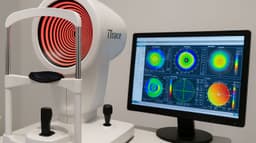
Diseases Of The Cornea
The cornea is a crucial component of the eye, serving as the clear, outermost layer that covers the front part of the eye. This transparent tissue plays a pivotal role in vision by refracting and focusing light onto the retina. It contributes significantly to the eye's ability to bend and transmit light, aiding in the creation of a sharp and clear visual image. Moreover, the cornea acts as a protective barrier against foreign particles and contributes to the eye's overall structural integrity. Any abnormalities or damage to the cornea can impact vision quality, emphasising its essential role in maintaining the eye's optical function and overall health. Regular eye care and attention to corneal health are crucial for preserving clear and comfortable vision.
Common Cornea Diseases
The complexity of corneal diseases lies in the wide array of conditions that can affect this crucial eye structure. From infections and inflammation to degenerative disorders and genetic anomalies, corneal diseases present a diverse set of challenges. Each condition may involve intricate interactions between genetic predispositions, environmental factors, and the immune system, making diagnosis and treatment intricate processes. Furthermore, the delicate balance required for the cornea to maintain its transparency and refractive properties adds another layer of complexity. Corneal diseases can manifest in various ways, affecting visual acuity, causing discomfort, and potentially leading to significant vision impairment if not addressed promptly and accurately. Comprehensive understanding and specialised care are essential to navigate the complexities of corneal diseases and provide effective management tailored to each patient's unique circumstances.
Common cornea diseases include:
Keratitis
- Description: Inflammation of the cornea, often caused by infections, trauma, or contact lens misuse.
- Treatment: Treatment may involve topical or oral antibiotics, antifungal medications, or antiviral drugs, depending on the cause.
Keratoconus
- Description: A progressive thinning and bulging of the cornea, leading to distorted vision.
- Treatment: Mild cases may be managed with glasses or contact lenses, while Progressive cases could be halted with Collagen Cross Linking procedure, while moderate or even severe cases could be managed with minimally invasive procedure, which is only available in a scarce clinics around the globe, such as CAIRS procedure (Corneal Allogenic Intrastromal Ring Segment), which is a human ring implanted inside the affected cornea to flatten it and to render the corneal surface to be more regular, hence improving the vision. The first CAIRS implant in the UK was done at My-iClinic and now more patients are experiencing very good results with their vision. Other minimally invasive surgery for Keratoconus cases at My-iClinic, is the Femtosecond-assisted lenticule implantation (FSALI), which is another human tissue implantation, reserved for severe cases, as our strategy in My-iClinic is to prevent the use of full-thickness corneal graft.
Fuchs' Dystrophy
- Description: Gradual degeneration of endothelial cells leads to corneal swelling and cloudy vision.
- Treatment: In the early stages, management may include eye drops and ointments. Advanced cases may require DMEK surgery (Descemet Membrane Endothelial Keratoplasty), which is a minimally invasive surgery, done under local anaesthesia, with a very good visual result)
Corneal Ulcers
- Description: Open sores on the cornea are often caused by infection or injury.
- Treatment: Antibacterial, antifungal, or antiviral medications may be prescribed, and in severe cases, surgical intervention may be necessary.
Corneal Abrasion
- Description: Surface scratches or injuries to the cornea, leading to pain and discomfort.
- Treatment: Typically heals on its own, but antibiotic ointments may be prescribed to prevent infection.
Corneal Dystrophies
- Description: Inherited conditions causing abnormal deposits in the cornea, affecting clarity.
- Treatment: Depending on the specific dystrophy, treatments may include medications, laser therapy, or, in advanced cases, corneal transplantation.
Corneal Neovascularization
- Description: The growth of abnormal blood vessels into the cornea, often a response to injury or inflammation.
- Treatment: Addressing the underlying cause and managing inflammation; in some cases, laser therapy may be considered.
Herpes Simplex Keratitis
- Description: Viral infection causing recurrent inflammation of the cornea.
- Treatment: Antiviral medications, topical steroids, or oral antiviral drugs may be prescribed.
Other corneal conditions that are noteworthy include:
Pinguecula and Pterygium
- Growth of tissue on the conjunctiva (pinguecula) or extending onto the cornea (pterygium), often associated with sun exposure and environmental factors.
Corneal Ectasia
- A general term for conditions involving corneal thinning and shape distortion, including keratoconus.
Corneal Hydrops
- A rare complication of advanced keratoconus, characterised by sudden corneal swelling and vision loss.
Corneal Lacerations or Penetrating Injuries
- Traumatic injuries can result in corneal damage, requiring immediate medical attention.
While it's not feasible to provide an exhaustive list of all possible corneal diseases due to the vast and evolving nature of medical knowledge, the information shared here covers a range of common and noteworthy conditions. Keep in mind that specific eye concerns are best addressed through consultation with an eye care professional, who can offer a more in-depth understanding of your unique eye health and provide tailored guidance.

What Are The Signs Of Corneal Disease?
The signs of corneal disease can manifest in various ways, often affecting vision and causing discomfort. Blurred or distorted vision is a common indication, as the cornea plays a crucial role in refracting light for clear visual perception. Individuals with corneal diseases may experience sensitivity to light (photophobia), making it uncomfortable to be in well-lit environments. Other common signs include redness, tearing, or a feeling of grittiness or foreign body sensation in the eye, suggesting irritation or inflammation. Changes in the cornea's shape or thickness can lead to astigmatism, causing further visual disturbances.
In advanced cases, corneal diseases may result in more severe symptoms such as corneal swelling, persistent pain, or the development of a visible cloudy or opaque area on the cornea. Vision loss can occur if the corneal disease progresses untreated. Regular eye examinations are crucial for detecting early signs of corneal diseases, as prompt intervention can help manage these conditions effectively and prevent complications that may lead to permanent vision impairment. If individuals experience any of these signs or have concerns about their eye health, consulting with an eye care professional is essential for a comprehensive evaluation and appropriate management.
Is Corneal Disease Hereditary?
While certain corneal diseases can have a hereditary component, the influence of genetics on the development of these conditions can vary. Some corneal diseases are known to run in families, suggesting a genetic predisposition. Conditions such as corneal dystrophies, which involve abnormal deposits in the cornea, often have a hereditary pattern. Keratoconus, a condition characterised by progressive thinning and bulging of the cornea, can also have a genetic association.
However, not all corneal diseases are hereditary, and environmental factors, lifestyle, and other non-genetic factors can contribute to the development of corneal issues. Infections, injuries, and inflammatory conditions affecting the cornea may not necessarily have a genetic link.
Is Corneal Disease Curable?
The curability of corneal disease depends on the specific type of disease and its severity. Some corneal conditions can be effectively managed and treated, while others may require ongoing care or surgical intervention. Here are a few examples:
Corneal Infections
Bacterial, viral, or fungal infections of the cornea are typically treatable with medications, such as antibiotics or antiviral drugs. Early detection and prompt treatment are crucial to prevent complications.
Corneal Abrasions
Minor scratches or abrasions on the cornea often heal on their own with proper care. Antibiotic ointments may be prescribed to prevent infection during the healing process.
Corneal Dystrophies
Some corneal dystrophies are progressive and may not have a cure, but they can be managed to alleviate symptoms. In some cases, surgical procedures, such as corneal transplantation, may be considered for advanced cases.
Keratoconus
Management of keratoconus may involve the use of glasses or contact lenses in mild cases. Progressive cases could be halted with Collagen Cross Linking procedure, while moderate or even severe cases could be managed with minimally invasive procedure, which is only available in a scarce clinics around the globe, such as CAIRS procedure (Corneal Allogenic Intrastromal Ring Segment), which is a human ring implanted inside the affected cornea to flatten it and to render the corneal surface to be more regular, hence improving the vision. The first CAIRS implant in the UK was done at My-iClinic and now more patients are experiencing very good results with their vision. Other minimally invasive surgery for Keratoconus cases at My-iClinic, is the Femtosecond-assisted lenticule implantation (FSALI), which is another human tissue implantation, reserved for severe cases, as our strategy in My-iClinic is to prevent the use of full-thickness corneal graft.

What Happens If The Cornea Is Damaged?
The consequences of corneal damage can vary depending on the nature and extent of the injury or condition. The cornea is a critical part of the eye responsible for refracting light and contributing to clear vision. Here are some potential outcomes when the cornea is damaged:
Blurred Vision
Damage to the cornea can lead to a disturbance in the normal refraction of light, resulting in blurred or distorted vision. This is a common consequence of corneal injuries or certain conditions.
Pain and Discomfort
Corneal damage, such as abrasions or infections, can cause pain, discomfort, and sensitivity to light. The cornea has a rich supply of nerves, and any injury to this area can be painful.
Infections
Corneal injuries may create a pathway for bacteria, viruses, or fungi to enter the eye, leading to infections such as keratitis. Infections can further compromise vision and require prompt treatment.
Scarring
Severe or improperly healed corneal injuries can result in scar tissue formation. Scarring may affect the transparency of the cornea, leading to persistent visual impairment.
Corneal Ulcers
Injuries or infections that are left untreated or inadequately managed can progress to corneal ulcers, which are open sores on the cornea. Corneal ulcers can be serious and may lead to vision loss if not addressed promptly.
Corneal Swelling (Edema)
In certain conditions, such as Fuchs' dystrophy, the cornea may swell due to dysfunction of the endothelial cells. Corneal edema can cause visual disturbances and discomfort.
Vision Loss
In severe cases of corneal damage that cannot be effectively treated, vision loss may occur. This is more likely in situations where the damage extends beyond the superficial layers of the cornea.
It's crucial to seek prompt medical attention for any suspected corneal damage or injury. Eye care professionals can assess the extent of the damage, provide appropriate treatment, and help minimise potential long-term consequences.

Next Steps
Have you experienced corneal damage, leading to blurred vision, discomfort, or other visual disturbances? At My-iClinic in London, our team of dedicated eye care professionals specialises in providing advanced solutions for cornea damage. Utilising state-of-the-art diagnostic tools and cutting-edge treatments, we are committed to assessing and addressing your unique eye health needs.
Take the First Step Towards Clearer Vision!
Don't let corneal damage compromise your eyesight. Schedule a consultation with My-iClinic today. Our team is dedicated to restoring clarity, alleviating discomfort, and optimising your visual health. Call us or book your appointment. Your journey to renewed vision begins with My-iClinic in London!
Find out more by Speaking to our team









